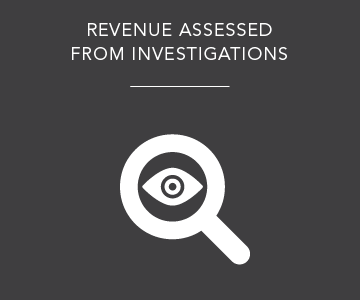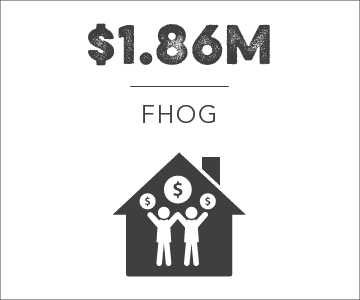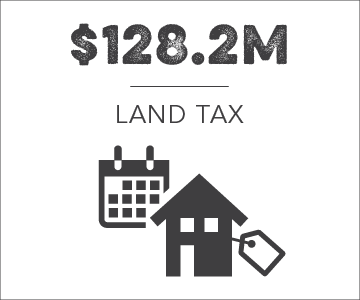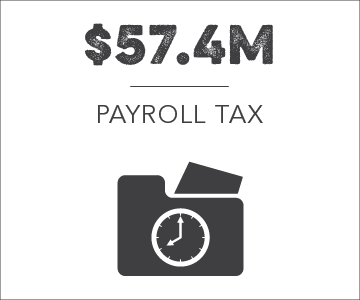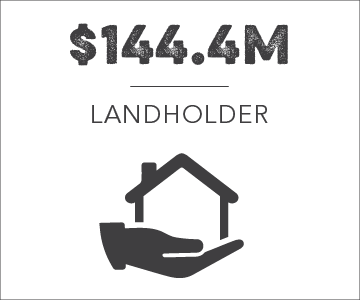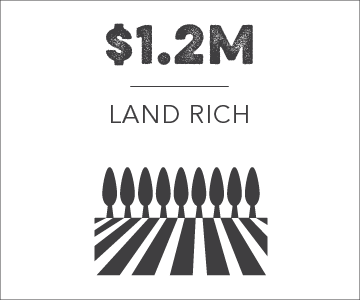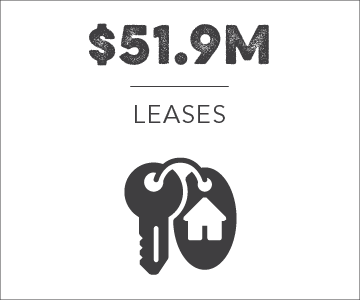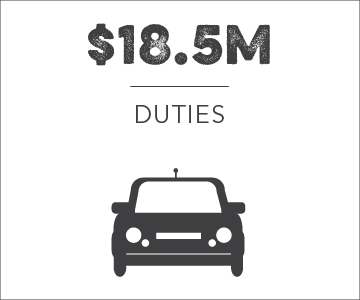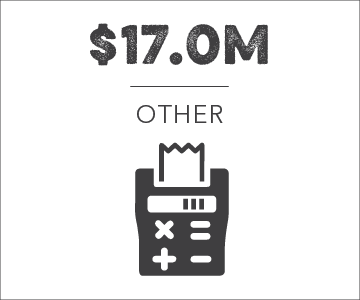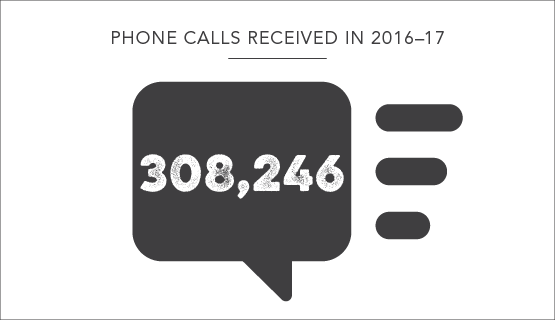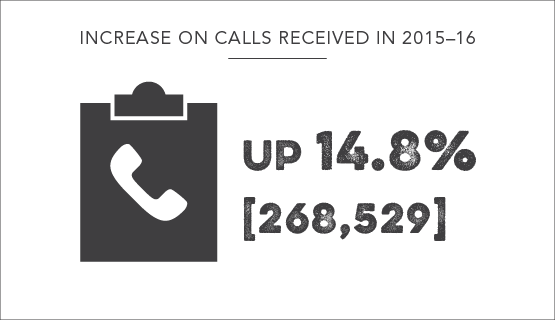Our specialist skills are integrated across the business so that expertise is best applied in critical areas that uphold our commitment to outstanding customer service.
Each plays a major role in upholding our commitment to deliver benefits for all Victorians, and supports our frontline staff and revenue experts.
Notable achievements in 2016-17 to assist customers included:
- Exceeding a Statement of Expectations requirement to increase the volume of land tax assessments issued electronically by 60 per cent (we achieved 300 per cent),
- Supporting administration of the Back to Work Scheme and preparations to implement the Vacant Residential Land Tax and the Commercial Passenger Vehicle Service Levy,
- Delivering a successful strategy to significantly redesign the 2017 land tax assessment notice and extend first-call resolution for over-the-phone amendments,
- Improving the convenience for customers to lodge online duties refund applications, targeting an uptake of 35 per cent (we achieved 66 per cent),
- Commencing work on transitioning all SRO forms to digital SmartForms, which will improve the customer experience through greater convenience and a streamlined navigation, and
- Answering 308,246 phone calls from customers, up 14.8 per cent on the 2015-16 year
Policy and legislation
We support a range of revenue management functions by developing practical solutions to complex policy problems. This principally includes working closely with stakeholders including the Department of Treasury and Finance, and the Office of the Chief Parliamentary Counsel, to assist in the development of the legislation we administer.
In-house support is provided to assist SRO officers in their understanding of policy design of the state taxes regime, and as a key liaison point for our inter-jurisdictional colleagues in the areas of harmonisation and collaboration.
Our specialists also provide the lead function for information, privacy, Human Rights Charter and Ombudsman issues.
In 2016-17, notable legislative work included the introduction of:
- The State Taxation Acts Further Amendment Act 2016, which included:
- Amendments to the Land Tax Act 2005 to align the date for the determination of the taxable value of non-rateable non-leviable land with the date that applies to other land, and we made a minor correction to one of the surcharge rates of land tax for absentee trusts.
- Updated the way the payroll tax exempt rate used in the calculation of the exempt component of motor vehicle allowances is determined.
- Amendments relating to the imposition, apportionment and payment of GAIC on subdivisions, the sole purpose of which is to provide public purpose land.
- Amendments to the Valuation of Land Act 1960 to clarify the definition of general valuation; to permit the Valuer-General to accept a late nomination from a collection agency to be the valuation authority for the purpose of valuing non-rateable leviable land and to require notices of valuation to show the Australian Valuation Property Classification Code (AVPCC) allocated to the relevant land.
- The State Taxation and Other Acts Amendment Act 2017, which included:
- Numerous budget announcements, including restricting the land transfer duty exemption for transfers between spouses/domestic partners to their principal place of residence; increasing the rate of motor vehicle duty for new passenger cars, which do not exceed the luxury car tax threshold, from 1 July 2017 to align with the rate for used cars; introducing an exemption from insurance duty for agricultural products; bringing forward the previously announced payroll tax threshold increases by 12 months, so that the threshold will be increased to $625,000 in 2017-18 and $650,000 in 2018-19; reducing the payroll tax rate for regional businesses to 3.65 per cent from 1 July 2017; and providing an exemption from the First Home Owner Grant residency requirement for Defence Force personnel.
- A number of measures as part of the Homes for Victorians package, including a new land transfer duty exemption for first-home buyers purchasing a home valued at or below $600,000 and a concession for first-home purchases valued between $600,001 and $750,000; restricting the off-the-plan duty concession to properties acquired by owner/occupiers who are eligible for the principal place of residence or first-home buyer duty concessions; increasing the amount of the First Home Owner Grant for regional new home purchases to $20,000; and introducing a Vacant Residential Land Tax from 1 January 2018 which will impose a 1 per cent tax on the capital improved value of residential properties which are vacant for at least six months.
- Other amendments include changes made to the Duties Act 2000 to remove the requirement for land owners to submit statutory declarations and make consequential changes to increase the maximum penalties for false or misleading statements or omissions; amendments to the sub-sale provisions to ensure the correct amount of duty can be collected and to extend the definitions of ‘listed company’ and ‘listed trust’ for the purposes of the landholder duty provisions.
- Amending the Planning and Environment Act 1987 to enable rounding of the annually adjusted Metropolitan Planning Levy (MPL) threshold.
- Amending the Taxation Administration Act 1997 to authorise the collection of additional information relating to real property transfers; authorise the disclosure of information to another government agency or statutory officeholder for data matching purposes; remove the current restriction on the SRO using information provided in livestock duty returns in the administration of other taxes; and to increase the maximum penalties for false or misleading statements or omissions.
- Amending the Unclaimed Money Act 2008 to make it a criminal offence for a person to provide false or misleading information in relation to a claim for unclaimed money listed in the register.
Objections and private rulings
We issue private rulings and determine objections for all revenue lines we administer.
Our technical experts also strive to ensure that the complexities of the taxation legislation we administer are clearly and concisely communicated at all levels.
In 2016-17, notable achievements included:
- 1547 objections determined to 4066 assessments (86 per cent completed within its 90-day KPI), and
- 1154 private rulings or exemption request decisions issued (92 per cent completed within its 90-day KPI), including determining more than 157 applications for exemption from the new foreign purchaser additional duty and land tax absentee owner surcharge provisions
Litigation and appeal resolution
Each year we assess and process more than 600,000 transactions, including applications for exemptions and grants.
The vast majority of these decisions are undisputed, however, a small percentage is objected to by customers who question whether a particular situation attracts a tax liability or dispute their eligibility for a concession/exemption.
In these circumstances where we are unable to reach an internal resolution, customers may seek to have their matter determined by the Victorian Civil and Administrative Tribunal (VCAT) or the Supreme Court. In 2016-17, we received 109 requests seeking referral of a matter to VCAT or the courts (including appeals by either party and refund applications).
Our legal specialists generally resolve approximately two-thirds of cases without the need for litigation (either before or after the matters are referred to VCAT or set down as an appeal in the Supreme Court). However, some remaining matters can only be resolved by substantive hearings (including matters on appeal). In 2016-17, the Commissioner’s original decisions/assessments were substantially upheld in 87 per cent of cases that proceeded to hearing.
Technology
Protecting our data and the privacy of customers are critically important to us.
In 2016-17, our ongoing active management program addressed the risk of cyberattacks and maintained the health and security of SRO systems.
We also initiated a number of new projects to further strengthen the security of our systems and ensure our customers are protected.
Compliance
Detecting cases where taxpayers are not meeting their obligations relies largely on accessing and cross-matching accurate and timely information.
Our expert teams accomplish this with sophisticated data-matching technology and ongoing agency collaboration. This approach is both effective and efficient, with 97 per cent of these cases revealing liabilities in the past year, up from 96 per cent in 2015-16. Supporting this is our overall strategy to maximise voluntary compliance through education and assistance so that customers can pay the right amount of tax at the right time.
Consequently, in 2016-17 our compliance teams assessed $420.3 million in outstanding liabilities from just over 11,357 cases and investigations. This is a 16.4 per cent increase on last year's assessed revenue ($360 million in 2015-16 from just over 10,600 investigations).
In addition, we also:
- Made determinations of 191 acquisition statements, 118 landholder/land rich ruling requests and 106 lease ruling requests,
- Delivered public education seminars on the tax provisions to legal and tax practitioners, and
- Made determinations of 15 trust registration applications under the landholder provisions.
